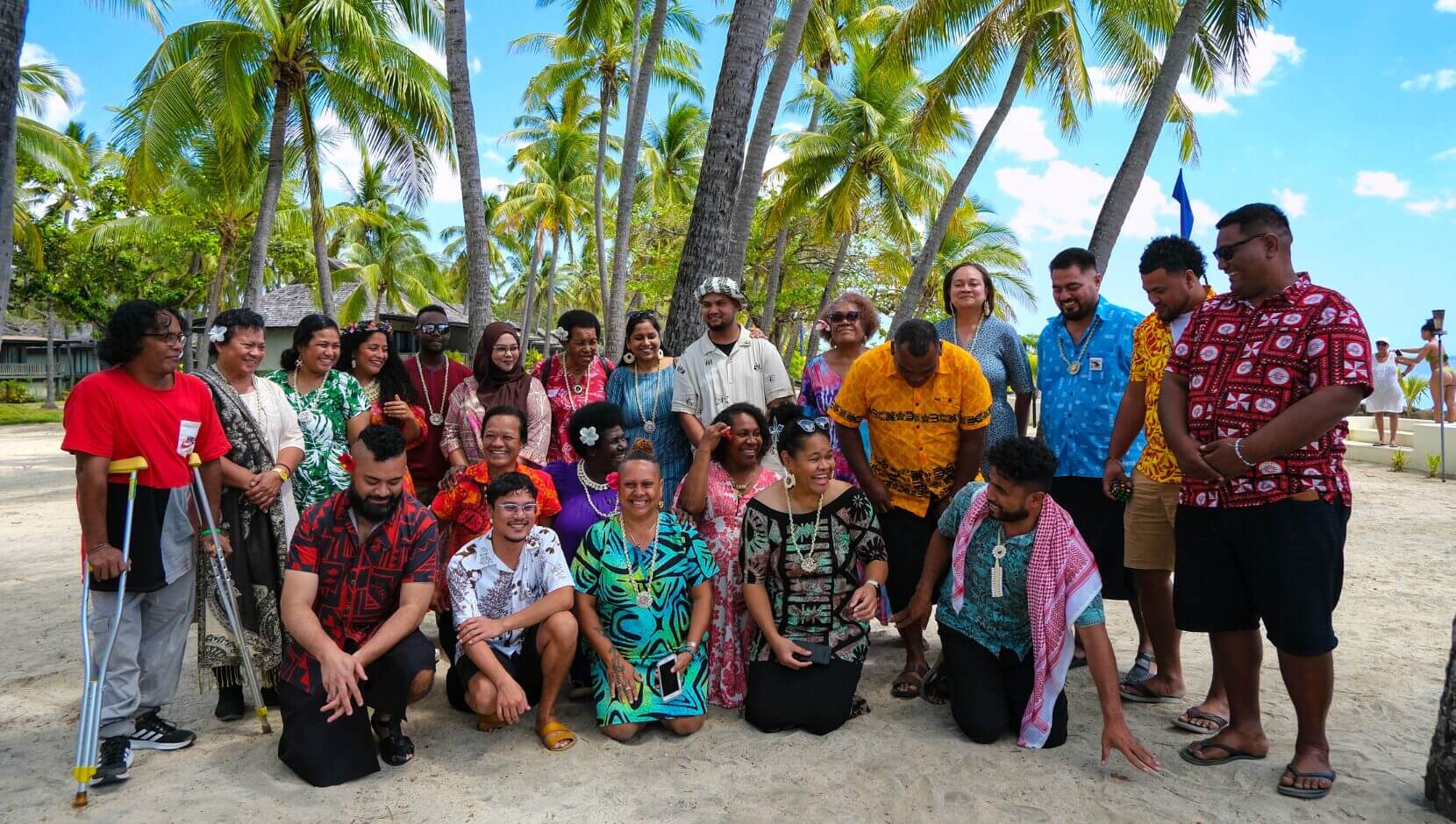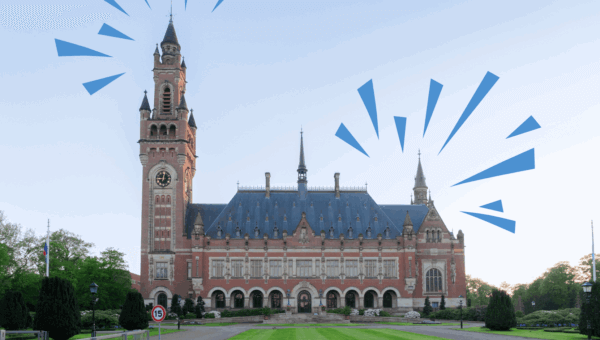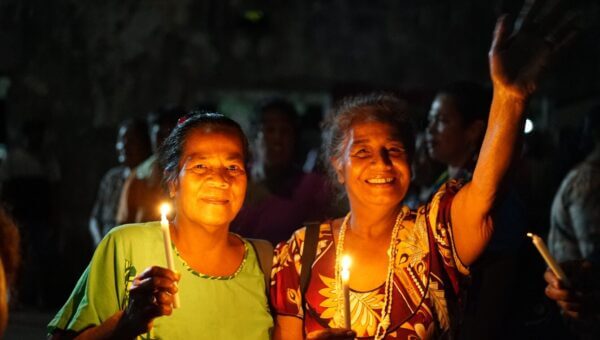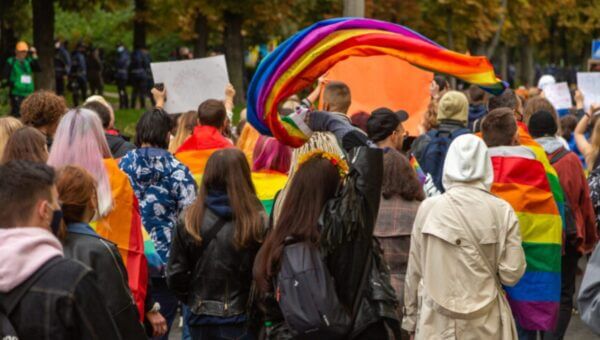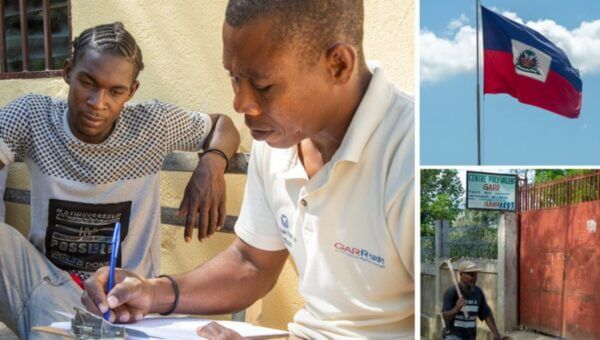“We are not drowning, we are fighting!” proclaim the grassroots leaders of the Pacific Islands. At September’s Pacific Rising conference in Fiji, UUSC partners from across the region reconnected for the fourth convening. They are united by their experience confronting the impacts of climate change, and they gather to exchange bold, local solutions to address the crisis. I witnessed firsthand their shared fears, unique challenges, rigorous care, and unwavering ambition.
As a Fijian woman, returning home to the land of my ancestors reconnects me to my culture and identity, reminds me of my responsibility to the vanua, and reaffirms my commitment to climate justice and accountability.
The Pacific Rising collective specifically addresses Non-Economic Loss and Damage (NELD). When states and institutions acknowledge the adverse effects of climate change, they generally think about economic factors like property damage. While this is one essential part of climate-related loss, solely focusing on economic factors erases integral aspects of life that are threatened or harmed by climate change. Pacific Rising leaders work to preserve cultural and traditional knowledge as they protect communities from rising seas.
One such leader is Ursula Rakova from our partner Tulele Peisa. At the convening, she shared how her relatives on the Carteret Islands are still living in their ancestral homes despite the rising seas. Households that the organization has relocated to Bougainville are missing their ancestral homes. The community mourns that their children will grow up without knowing where they came from.
Konea Ishimura and Jobod Silk from our partner Jo-Jikum shared the innovative strategies that they are adopting to preserve Marshallese ancestral intelligence. This includes creating storytelling kiosks to preserve sacred sites that are threatened by climate change. The kiosks include art designed by Marshallese youth and bring oral traditions, legends, and Indigenous ecological knowledge into public spaces. I was moved by both the trauma of deteriorating traditional knowledge and the determined preservation efforts by Marshallese youth.
Rae Bainteiti of the Banaban Human Rights Defenders Network shared how their advocacy for reparations faces legal challenges from their own traditional council leaders. Their courage persists despite being stifled for demanding accountability and speaking out against continued extractivism.
The Pacific Rising cohort embodies diligent hope. Our partners are grounded, strategic, and deeply invested in the potential of collective action. This hope has a transformative effect, cultivating shared joy and determination.
Our partners agree that it’s essential to share the ongoing need for funding that prioritizes the right to self-determination in global spaces. This includes the United Nations, and so I departed from Fiji for the U.N. General Assembly and New York Climate Week.
The change of venue was accompanied by an abrupt change in tone. Early remarks from Trump characterized climate change as a con job. While other global North leaders affirm science and work toward climate action, the solutions they propose forgo life-affirming efforts to preserve culture and make bold reparations. They rely on outdated funding mechanisms that uphold structural barriers for frontline communities.
The contrast between Pacific Rising and the New York events left me questioning: What is needed to implement climate solutions that prioritize human dignity? We need strong political will, state accountability, and unrestricted money that enables local leaders to best serve their communities.
Despite government attempts to separate these needs, they are deeply intertwined. Our Pacific partners’ diligent hope fuels their innovative solutions. Hope supports their efforts to transform systems. In contrast, members of the U.N. and participants in New York Climate Week broadly exhibit panicked hopelessness that drastically restricts their ability to understand and enact meaningful solutions. Global grassroots leaders were notably missing from the New York events, limiting the relevance, effectiveness, and creativity of the proceedings.
The people most impacted by the climate crisis aren’t afforded the luxury of hopelessness. They must continue to cultivate the belief that through collective action, a different future is possible. Grassroots leaders know that the future depends upon our collaboration, our faith, and our creativity.
I am traveling home as I write this, and I am feeling the urgency of my commitment to climate justice. I invite you to join me in advocating for the political will, state accountability, and decolonized funding models that, together, will meaningfully support grassroots climate solutions. Next month, 8 of our grassroots partners will attend COP 30, the U.N. climate change conference, where attendees discuss and negotiate action on climate change. Express your support for these frontline leaders today as they advocate for sustainable, bold solutions.
I will soon return home and hug my sons with the diligent, joyful hope emboldened in me by our Pacific partners. I believe that my children and their descendants will be able to visit the home of their ancestors with pride and dignity. I will work to make it so.
